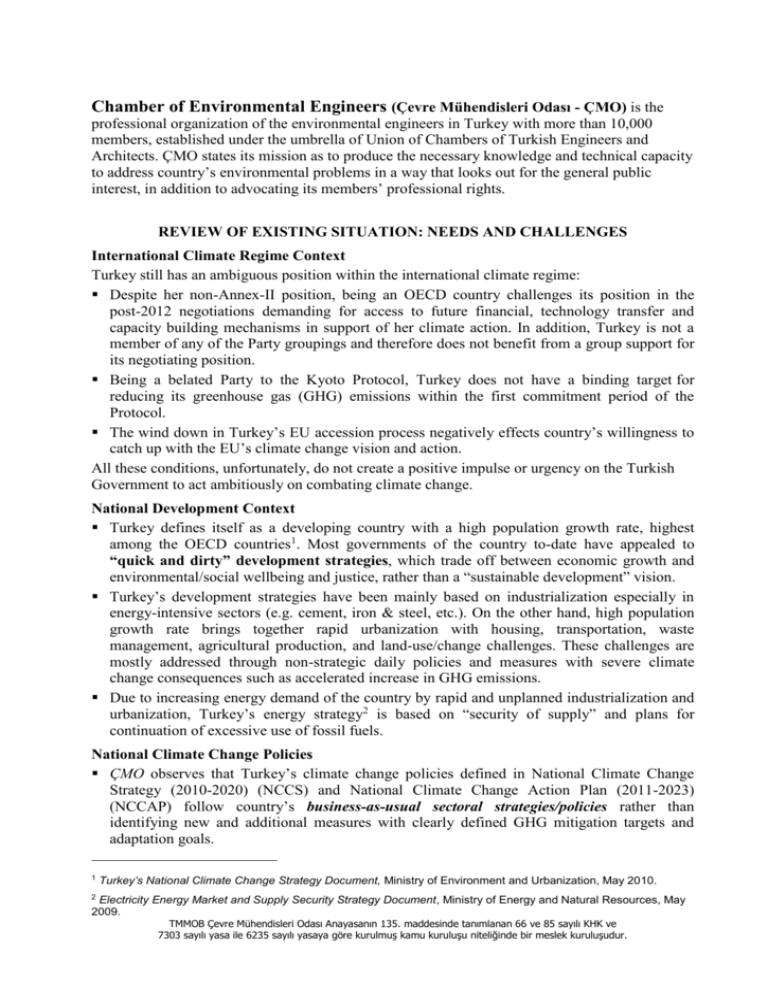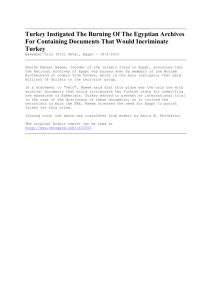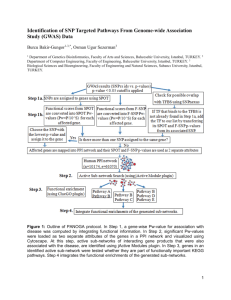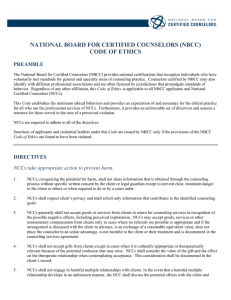Chamber of Environmental Engineers (Çevre Mühendisleri Odası
advertisement

Chamber of Environmental Engineers (Çevre Mühendisleri Odası - ÇMO) is the professional organization of the environmental engineers in Turkey with more than 10,000 members, established under the umbrella of Union of Chambers of Turkish Engineers and Architects. ÇMO states its mission as to produce the necessary knowledge and technical capacity to address country’s environmental problems in a way that looks out for the general public interest, in addition to advocating its members’ professional rights. REVIEW OF EXISTING SITUATION: NEEDS AND CHALLENGES International Climate Regime Context Turkey still has an ambiguous position within the international climate regime: Despite her non-Annex-II position, being an OECD country challenges its position in the post-2012 negotiations demanding for access to future financial, technology transfer and capacity building mechanisms in support of her climate action. In addition, Turkey is not a member of any of the Party groupings and therefore does not benefit from a group support for its negotiating position. Being a belated Party to the Kyoto Protocol, Turkey does not have a binding target for reducing its greenhouse gas (GHG) emissions within the first commitment period of the Protocol. The wind down in Turkey’s EU accession process negatively effects country’s willingness to catch up with the EU’s climate change vision and action. All these conditions, unfortunately, do not create a positive impulse or urgency on the Turkish Government to act ambitiously on combating climate change. National Development Context Turkey defines itself as a developing country with a high population growth rate, highest among the OECD countries1. Most governments of the country to-date have appealed to “quick and dirty” development strategies, which trade off between economic growth and environmental/social wellbeing and justice, rather than a “sustainable development” vision. Turkey’s development strategies have been mainly based on industrialization especially in energy-intensive sectors (e.g. cement, iron & steel, etc.). On the other hand, high population growth rate brings together rapid urbanization with housing, transportation, waste management, agricultural production, and land-use/change challenges. These challenges are mostly addressed through non-strategic daily policies and measures with severe climate change consequences such as accelerated increase in GHG emissions. Due to increasing energy demand of the country by rapid and unplanned industrialization and urbanization, Turkey’s energy strategy2 is based on “security of supply” and plans for continuation of excessive use of fossil fuels. National Climate Change Policies ÇMO observes that Turkey’s climate change policies defined in National Climate Change Strategy (2010-2020) (NCCS) and National Climate Change Action Plan (2011-2023) (NCCAP) follow country’s business-as-usual sectoral strategies/policies rather than identifying new and additional measures with clearly defined GHG mitigation targets and adaptation goals. 1 Turkey’s National Climate Change Strategy Document, Ministry of Environment and Urbanization, May 2010. 2 Electricity Energy Market and Supply Security Strategy Document, Ministry of Energy and Natural Resources, May 2009. TMMOB Çevre Mühendisleri Odası Anayasanın 135. maddesinde tanımlanan 66 ve 85 sayılı KHK ve 7303 sayılı yasa ile 6235 sayılı yasaya göre kurulmuş kamu kuruluşu niteliğinde bir meslek kuruluşudur. NCCS and NCCAP do not include any strategies or measures to review and revise existing sectoral policies which conflict with the planned CC policies of the country. Examples to this issue are: o Plans to construct a third bridge on Bosporus (Istanbul) for road transport, o Provision of EIA exemption for some mining activities in agricultural and forest lands, o Plans to allocate degraded forest lands (widely known as 2B lands) to economic activities such as tourism housing investments rather than rehabilitation and reforestation of these lands. NCCS and NCCAP are exclusively based on the analyses of investment and operational costs of possible GHG abatement actions; however economic, social and environmental impacts/benefits of these actions over time were not included in these analyses. Neither NCCS nor NCCAP defines clear, effective and transparent policies on identification, allocation and use of national (e.g. government funds and incentives) and international (e.g. Clean Technology Fund) financial resources for CC action of the country. Well-defined mechanisms are missing for identification and prioritization of eligible projects; measurement, reporting and verification (MRV) of GHG reductions and external costsbenefits of the outputs of financed projects; and communication of the results with the general public. Turkey lacks a strong CC institutionalization for implementation and monitoring/evaluation of the existing and planned CC actions. The Coordination Board on Climate Change has a monitoring committee, but lacks the necessary enforcement power for actualization of the NCCS and NCCAP. Integration of Economic, Environmental and Social Welfare and Justice Aspects to CC Policy ÇMO is critically concerned about the lack of proper mechanisms to ensure integration of economic, environmental and social welfare and justice aspects in CC Policy and measures. There are crucial problems in implementation of already existing tools such as Environmental Impact Assessment (EIA), Regulatory Impact Assessment (RIA), and the Law on Public Access to Information. Example: Hydropower is observed to be the first choice of the Government in its renewable energy policy as an important part of its CC action. However, recent hydropower projects have proved to be jeopardizing environmental and social welfare and justice, mainly due to proper implementation of EIA. Turkey still has not adopted some of the most important tools such as EU’s Strategic Impact Assessment Directive and Aarhus Convention. This is a crucial obstacle in involvement of civil society in CC policy making and public control on implementation of policies, private sector and public investments. Therefore, Keeping in mind the vital necessity of transformation of country’s economy to low carbon, ÇMO is critically concerned about the existing and future CC policies/actions overall impacts on environment, society and economy, in case the process continues without proper integrated strategic planning, impact assessment, monitoring and evaluation and public participation processes. ÇMO also has serious concerns about carbon leakage from developed countries to developing countries as a side-effect of low carbon transition of economies. Among the main sectors/actions of concern are biofuel production and transition to low carbon technologies in energy-intensive industries (e.g. iron and steel, cement, ceramics production). TMMOB Çevre Mühendisleri Odası Anayasanın 135. maddesinde tanımlanan 66 ve 85 sayılı KHK ve 7303 sayılı yasa ile 6235 sayılı yasaya göre kurulmuş kamu kuruluşu niteliğinde bir meslek kuruluşudur. COMMENTS AND QUESTIONS How do you see EU’s role in Turkey’s encouragement for a more ambitious climate action and its transformation to low carbon economy? Could you also elaborate on Turkey’s role as a developing and neighboring country in EU’s own Climate Action? What is the position of the EU in regards to MRV’ing as well as monitoring & evaluation of the environmental (other than GHG reduction), social and economic impacts of CC actions financed through international financing mechanisms (i.e. soft loans such as Clean Technology Fund)? TMMOB Çevre Mühendisleri Odası Anayasanın 135. maddesinde tanımlanan 66 ve 85 sayılı KHK ve 7303 sayılı yasa ile 6235 sayılı yasaya göre kurulmuş kamu kuruluşu niteliğinde bir meslek kuruluşudur.






